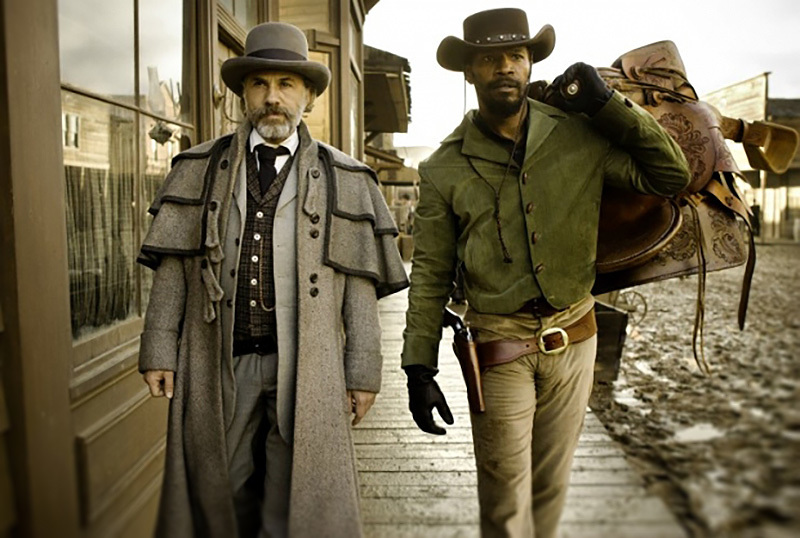
He’s 49 years old, but in some ways, Quentin Tarantino is still that genius kid in the video store. We can still see him rubbing his hands gleefully as he makes his films, drunk on film’s possibility. He makes up his own rules, smashing through genres, audaciously blurring time periods, laughing in the face of cinematic convention. He’s the filmmaker reimagined as part Mozart, part Willy Wonka, and part Sid Vicious. The end product is almost always obscenely entertaining.
But don’t make the mistake of thinking that Tarantino is all raging id. There’s rigor and even scholarship in his work. Indeed, it takes a lot of discipline to be so brilliantly anarchistic.
Tarantino makes me laugh at and revel in things I generally don’t like—extreme violence, for one; offensive language for another—which is one of his great gifts. Like all talented filmmakers, he’s a con-man, a grifter. He gets away with things because he’s that good. (Kids, do not try this at home.)
But I do think that, for all his mad scientist tricks, Tarantino’s greatest (and perhaps most underappreciated) gift is writing dialogue. Each character gets his or her on own patois, his own idiom, and delights in his own language—whether it be cracked slang or floridly pretentious wordplay. And when Tarantino wants to write someone genuinely witty and eloquent—as is the case with Django Unchained’s droll bounty hunter King Schultz (Christoph Waltz)—it’s a marvelous thing to behold.
Tarantino’s last film was the enormously satisfying Inglourious Basterds, a warped revenge pic about a gang of Jewish toughs killing Hitler. As a Jewish woman, I can say I had zero problem with Tarantino taking on my people’s collective tragedy. The genius was, it was the Jews who did the clobberin’. I cheered wildly.
Tarantino seems to be on his “if only history was super cool” kick right now. Because with Django Unchained, he’s getting his revenge on white slave owners in the south. In many ways, this is a companion piece to Inglorious Basterds—we’re still squarely in revenge flick mode, but instead of WWII spy clichés, Tarantino now mixes up a gumbo of spaghetti Westerns, blaxploitation, and even sweeping romance films. He wields the same trick as in Basterds: Tarantino may not be black, but he allows the film’s hero—Jamie Foxx’s freed slave Django—to do the majority of the butt-whipping. It doesn’t feel exploitative. It feels cathartic.
The plot, in short: Schultz rescues Django because he can identify three names on his bounty list. Schultz is morally repulsed by slavery, and takes an immediate liking to Django. When he sees that Django is also an excellent shot (“Fastest gun in the South,” Schultz dubs him), he makes him a deal: If Django helps Schultz kill the rest of the names on his bounty list, he’ll help Django penetrate the Mississippi Candyland Plantation where his beloved wife Broomhilda (Kerry Washington) is enslaved.
The first half of the film is a spirited buddy pic of sorts, as Schultz and Django travel the countryside, killing bad guys in all sorts of rococo ways, cheating death, and slowly bonding. Both Waltz and Foxx are brilliant—Foxx gives Django a steely dignity, a righteous reservoir of anger, and the tiniest bit of irony behind his watchful eyes. And Waltz should put up a shrine to Tarantino in his home (if he doesn’t have one already). For the second film in a row, Tarantino has generously given him a scene stealing role and the actor clearly relishes the task—wearing Schultz’s intellectual superiority with the same gusto and flourish that he wears his enormous fur coat.
In the film’s second half, this unlikely duo arrives at Candyland, meets both the loathsome plantation owner Calvin Candie (Leonardo DiCaprio) and his house slave Stephen (Samuel L. Jackson), and plots to rescue Broomhilda.
DiCaprio finds all sorts of disturbing grace notes—a tendency to infantilize himself, for one—in his role as the hedonistic, preening Candie, a man who thinks he’s refined but is, in fact, a boorish monster. But in a way, Jackson gives the bravest performance in the film. His Stephen is both dutifully loyal to his bratty boss and consumed with self-loathing (his jealousy over Django’s freedom manifests as suspicion and seething resentment). Jackson goes deep inside the conflicted mind of a so-called “Uncle Tom.” It’s riveting.
Alas, the film’s coda is overlong and unnecessarily bloody. For all his brilliance, I do wish that Tarantino was capable of showing some restraint. There’s a horrible scene of bare knuckled fighting to the death that I had to look away from (unfortunately, the soundwas possibly worse than the visuals). Later, a slave—named D’Artagnan by the pretentious Candie (even though he has never read a word of Dumas and doesn’t speak a lick of French)—is ordered to be mauled to death by dogs.
As I watched, I thought: We don’t need to see the mauling. Just the disgusted look on Schultz’s face; the seething fury in Django’s eyes would be more than enough. In fact, they might be more effective. But that’s not Tarantino’s style. He’ll show us the dog mauling every single time.
With Tarantino, you’ve got to take the good excesses with the bad ones. In the end, it’s more than worth it.
